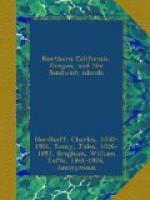These Tule lands—the word is pronounced as though spelled “toola”—are simply deposits of muck, a mixture of the wash or sediment brought down by the Sacramento and San Joaquin rivers with the decayed vegetable matter resulting from an immense growth of various grasses, and of the reed called the “tule,” which often grows ten feet high in a season, and decays every year. The Tule lands are in part the low lands along the greater rivers, but in part they are islands, lying in the delta of the Sacramento and San Joaquin rivers, and separated from each other by deep, narrow “sloughs,” or “slews” as they are called—branches of these rivers, in fact. Before reclamation they are overflowed commonly twice a year—in the winter, when the rains cause the rivers to rise; and again in June, when the melting of the snows on the mountains brings another rise. You may judge of the extent of this overflowed land by the following list of the principal Tule Islands:
Acres.
Robert’s Island.......................67,000 Union Island..........................50,000 Grizzly Island........................15,000 Sherman Island........................14,000 Grand Island..........................17,000 Ryer Island...........................11,800 Staten Island..........................8,000 Bacon Island...........................7,000 Brannan Island.........................7,000 Bouldin Island.........................5,000 Mandeville Island......................5,000 Venice Island..........................4,000 Tyler Island...........................4,000 Andros Island..........................4,000 Twitchell Island.......................3,600 Sutter Island..........................3,000 Joyce Island...........................1,500 Rough and Ready Island.................1,500 Long Island............................1,000
In all...........................217,400
These are the largest islands; but you must understand that on the mainland, along the Sacramento and its affluents, there is a great deal of similar land, probably at least twice as much more, perhaps three times.
The swamp and overflowed lands were given by Congress to the State; and the State has, in its turn, virtually given them to private persons. It has sold them for one dollar per acre, of which twenty per cent. was paid down, or twenty cents per acre; and this money, less some small charges for recording the transfer and for inspecting the reclamation, is returned by the State to the purchaser if he, within three years after the purchase, reclaims his land. That is to say, the State gives away the land on condition that it shall be reclaimed and brought into cultivation.
During a number of years past enterprising individuals have undertaken to reclaim small tracts on these islands by diking them, but with not encouraging success, and it was not until a law was passed empowering the majority of owners of overflowed lands in any place to form a reclamation district, choose a Board of Reclamation, and levy a tax upon all the land in the district, for building and maintaining the dikes or levees that these lands really came into use.




